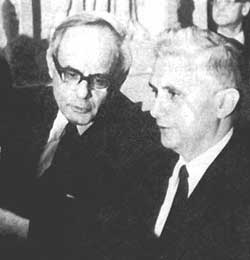
Cardinals Turn On Pope Invisible
By John Follain, Sunday London Times
IN the hushed Apostolic Palace off St Peter’s Square, Pope Benedict XVI starts the day with a 7am mass in his private chapel, followed by a lone breakfast.
No press summary is brought to him.
He meets a few visitors in the morning and then, after a lunch served on gold-rimmed plates bearing his seal, retires to his study to write speeches and read theological works throughout the afternoon and evening.
The Pope’s daily routine, as described by Vatican insiders, is being blamed for a series of blunders that have prompted a rare show of dissent from exasperated cardinals.
Critics claim he is leading the church and its 1.2 billion faithful like a monarch cut off from the world outside his palace windows, helped only by loyal but inept advisers. (Sounds more like a professor in an ivory tower surrounded by perpetual grad students.)
“People feel disoriented,” a senior Vatican official confided last week. “It’s a feeling common to both traditionalists and reformers. Our impression is that there isn’t anyone at the wheel.” (There is in the morning---sort of.)
Hailed by his peers as “the most intelligent” candidate when he was elected Pope in 2005, the 81-year-old German pontiff has provoked outrage and a rebuke from Angela Merkel, the German chancellor, by revoking the excommunication of four breakaway bishops from the ultra-conservative Society of St Pius X.
They included a British bishop, Richard Williamson, who has denied the existence of Nazi gas chambers.
Benedict then named Father Gerhard Maria Wagner as the Bishop of Linz, in Austria. Wagner had preached that Hurricane Katrina was retribution for the activities of abortionists, prostitutes and homosexuals in New Orleans.
Simmering discontent within the church exploded with the debacle over Williamson, who was subsequently removed from his post as head of a seminary in Buenos Aires and ordered to leave Argentina.
German Cardinal Walter Kasper, in charge of Jewish relations, denounced “misunderstandings and management errors in the curia” (the Pope’s civil service) – an implicit attack on the Pope himself.
Upset by the Williamson and Wagner decisions, Austrian Cardinal Christoph Schönborn met the Pope in Rome earlier this month. The audience failed to reassure Schönborn, who called a meeting of Austrian bishops. They in turn urged the Vatican to learn from past mistakes and respect the rules for appointing bishops. They demanded “scrupulousness” and “sensitivity” in future.
Violating the custom that cardinals do not criticise one another, Cardinal Giovanni Battista Re, head of the congregation of bishops, launched a loud denunciation of his Colom-bian colleague, Cardinal Dario Castrillon Hoyos, who was in charge of relations with the Society of Pius X.
On a bus carrying dignitaries to a religious ceremony in Rome, Re was overheard protesting that Castrillon Hoyos had forced colleagues to take a hasty decision. “He only gave me a few hours to sign. All because Castrillon will soon turn 80 and retire. If he hadn’t solved the problem right away, it would have been too late for him,” Re fumed. (Cardinal Hoyos must have put a gun to Cardinal Re's head. Or maybe Hoyos just took Re for a high speed spin in his Maserati and threatened not to let him out until he signed.)
For many inside the Vatican, the issue is the Pope’s style of leadership.
“People feel that the Pope is governing in a very monarchical way. He fails to consult bishops and he has isolated himself by ignoring advice which could stop him making mistakes,” said Marco Politi, a leading Vatican analyst.
“The Pope believes he doesn’t need to take account of public opinion. He studies the files that are brought to him and decides very much on his own. The atmosphere around him is that he mustn’t be disturbed by criticism or visitors.” (This does not describe someone with a great deal of self esteem.)
Benedict offended Muslims with a 2006 speech quoting a Byzantine emperor who described the prophet Muhammad’s teachings as “evil and inhuman”.
He upset Israel and Jews by saying he wanted to make a saint of Pope Pius XII, despite criticism that Pius had failed to speak out against the Holocaust during the second world war.
Then he offended homosexuals by saying that their behaviour was a “destruction of God’s work”.
Benedict is ruling the church “from the top of the mainmast, he doesn’t have experience of holding the rudder”, said Gian-carlo Zizola, a writer on Vatican affairs. “He performs the duties of a pope in the mornings, but in the afternoon and evenings he’s a theologian.”
Benedict meets far fewer people than John Paul II and does not share his predecessor’s habit of inviting guests to lunch and dinner. On the top floor of the Apostolic Palace he is flanked by Georg Gänswein, 52, his personal secretary.
“Father Georg is very strict, he selects who does and doesn’t see the Pope and keeps everyone punctual,” a Vatican observer said. (Perhaps Msgr. Georg is the one who is really in charge.)
Several insiders fault Benedict’s choice of advisers, most of whom he has known for years.
“The Pope has surrounded himself with collaborators who act more like obsequious subjects than real advisers,” said Zizola. (Sounds like a bunch of grad students.)
His main adviser, secretary of state Cardinal Tarcisio Bertone, 74, has the Pope’s ear but little political or diplomatic experience. (Which means he doesn't threaten Benedict's inadequacies.)
Church leaders are praying for a more harmonious leadership by the Pope, who will seek to mend relations with Israel on a visit to Jerusalem in May.
At the Vatican last week Gordon Brown invited Benedict to Britain later this year or next, which may also help to bolster the pontiff’s reputation.
Bertone is expected to make new appointments to strengthen his team soon.
“Sacking people would be like asking the Pope to go back on his decisions and that doesn’t happen,” Zizola said. (Is this a form of creeping infallibility or self esteem issue?)
“I expect the blunders will continue unless he decides to launch real reform of the way the church is run. Even in the Vatican you can’t just rely on the Holy Spirit.”
(If it's a self esteem issue, the blunders will continue.)
**********************************************************
For me this was a fascinating article because it's the first glimpse I've ever read into Benedict's daily life. Given the amount of writing he does I wondered how much time he actually spent governing the Church. From the sound of this, governing the church is a 'duty' he would prefer to engage in as little as possible. I don't find that particularly surprising because his life and identity are wrapped up in being an academic theologian.
Even as head of the CDF he was with in this comfort zone, and he had the additional authority to place his theology at the head of the list. Academics would kill for this kind of power. Talk about the ability to stifle academic debate. I don't know that I've ever been around a more passive/aggressive cut throat group of people than professional academics. There is a lot of ego and self esteem wrapped up in promoting and defending one's personal pet theories. Convince yourself that you are defending and promoting God's truth with your theology and it gets even more convoluted.
What I want to know is who is Georg Ganswein and why does he have this kind of authority on the Pope's behalf? Benedict is entitled to pick his own advisers. I don't have any problem with that, but the kind of influence this man has on how the Papacy functions is kind of alarming. I would have liked to have known if his prioritizing of people and time is a product of Benedict's or his own reasoning. In either case, it's causing real problems with in the Vatican, relationships with in the world, and for the College of Cardinals. The Church is supposed to be more than the vision of one or two people. That's spelled out quite clearly in a number of Vatican II documents.
Benedict is now in his early eighties. I seriously doubt there will be changes in the way the Vatican under this pope does business. Older people are usually not noted for accepting changes in their routines. Change is a matter of energy and Benedict seems to have his personal energy allocated just the way he wants it. This Pope is not John Paul II who seemed to derive a lot of his energy from relating to other people, something this Pope is studiously avoiding.
In that respect the two Popes are very different people. The Church they envisioned are two very different Churches even though their theological bent is similar. JPII revelled in relationships and Benedict avoids them. JPII fostered apostolates which focused on community building, albeit not necessarily healthy community building, and Benedict is focusing on a theology of the head centered on one relationship--that of the other worldly one we have with Jesus Christ.
In many respects Benedict's theology is top down and isolative. The problems he's engendering are direct consequences of his theology. The problems will continue and most likely get worse. Depending on what happens in Israel we may see his travel itinerary curtailed, most likely due to fatigue and age issues. All of those feelings are compounded when one chooses isolation, and this Pope does an awful lot to maintain his aloofness and isolation. What may work well for him, is not working well for the Church. Writing to people is not the same as interacting with people.
It's a one way communication.
Maybe that's why Jesus never wrote anything and taught by relating with people.
 Fr Ratzinger and Father Karl Rahner at Vatican II. My how times change.
Fr Ratzinger and Father Karl Rahner at Vatican II. My how times change.









